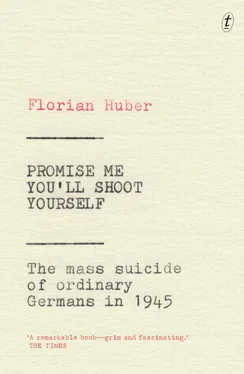• • •
On 26 January 1959, a fifty-five-year-old clerk came before the court in Hanover. Paul Kittel was charged with committing multiple manslaughter fourteen years before in the small town of Malchin in Mecklenburg. He was standing trial in West Germany, where he had settled after ten years in a Soviet camp.
His former hometown of Malchin is about thirty kilometres south of Demmin and, like Demmin, lies on the gently flowing Peene. Malchin and Demmin: two towns on the same river, with the same story. Malchin, too, was invaded by the Red Army on 30 April. Large parts of the town centre burnt down, and people flocked to the Peene to drown themselves. Later it was said that five hundred people had killed themselves within three days. On 1 May, Paul Kittel took the pistol of a neighbour who was already dead and shot first his wife and then his two sons, Ullrich and Joachim, aged thirteen and fourteen. According to statements given in court, all three had asked him to shoot them. He ended by turning the gun on himself, but nothing happened. There had been only three bullets in the pistol. Paul Kittel couldn’t kill himself. He couldn’t complete his murder-suicide.
The jury declared Paul Kittel of unsound mind at the time of the offence, though of course they had no way of knowing what had been going on in his mind, or in the minds of his wife and sons, in the preceding days and months and years. The Hannoversche Zeitung reported the case under the headline ‘Alive Thanks to Missing Bullet’. The journalist saw the drama of a family’s destruction as an almost unparalleled tragedy. Paul Kittel was acquitted of manslaughter. But the burden of memory he had to shoulder was, perhaps, worse than death.
p. 3 ‘ We reached…Demmin .’ Irene Bröker, So war’s! Lebenserinnerungen 1922–1997 , Deutsches Tagebucharchiv Emmendingen, 131, p. 66.
p. 5 ‘ We got bogged…night’s rest .’ Ibid.
p. 6 ‘ Wretched night…insoles .’ Gustav Adolf Skibbe, Kriegstagebücher 1944–1945 , 13.3, Deutsches Tagebucharchiv Emmendingen, 1344, 1, n. pag.
p. 6 ‘ Everything at sixes…overcrowding in town .’ Ibid., 15.3.
p. 6 ‘ without much of note ’. Ibid., 24.3–27.3.
p. 7 ‘ She was forever…evenings .’ Marie Dabs, Lebenserinnerungen , Lübeck, 1984, p. 77.
p. 8 ‘ They joined…wife and daughter! ’ Ibid., p. 78.
p. 8 ‘ It wasn’t just…blessed, too .’ Ursula Strohschein, ‘Rote Armee in Demmin’, Pommersche Zeitung , 1. April 1995, 13/95, p. 16.
p. 9 ‘ Crammed full of strangers ’. Ibid.
p. 10 ‘ What will become…defend Demmin .’ Ibid.
p. 11 ‘ Things…fall apart .’ Wilhelm Damann, ‘Die letzten Kriegstage 1945 in Demmin’, Demminer Regionalmuseum, newspaper 5093, folio 2.
p. 11 ‘ beggared belief…a word .’ Marie Dabs, Lebenserinnerungen , p. 79.
p. 12 ‘ The Russians…River Oder! ’ Ibid., p. 78.
p. 12 ‘ How naïve I was .’ Ibid., p. 67.
p. 12 ‘ Why didn’t I…ran its course .’ Ibid., p. 81.
p. 13 ‘ I had on my dark-grey…over my arm .’ Ibid., p. 80.
p. 13 ‘ for withdrawal purposes ’. Gustav Adolf Skibbe, Kriegstagebücher , 28.4.
p. 13 ‘ Murder. Manslaughter .’ Ibid., 30.4.
p. 13 ‘ hasty retreat ’. Ibid.
p. 13–14 ‘ Mum’s birthday…allowed out .’ Ibid., 29.4.
p. 14 ‘ The telephone…around the town .’ Irene Bröker, So war’s! , p. 67.
p. 15 ‘ But there we were…in a trap .’ Ibid., p. 68.
p. 19 ‘ The time has come…a new war .’ Call from the 2nd Belorussian Front’s Council of War, 16 April 1945.
p. 20 ‘ I do not…no longer tenable .’ Adolf Hitler, Mein politisches Testament, Gegeben zu Berlin, den 29. April 1945, 4.00 Uhr , folio 4.
p. 21 ‘ the potential suicide par excellence ’. Sebastian Haffner, Germany. Jekyll & Hyde. 1939— Deutschland von innen betrachtet , Berlin, 1998, p. 24.
p. 21 ‘ that the surrender…is impossible .’ Adolf Hitler, Mein politisches Testament , folio 6.
p. 22 ‘ I don’t want…circumstance .’ Adolf Hitler to Otto Günsche, in: Walter Kempowski, Swansong 1945: A Collective Diary of the Last Days of the Third Reich , tr. Shaun Whiteside, London: Granta, 2014, p 214. (Translation slightly modified.)
p. 22 ‘ Didn’t sleep…make it? ’ Gustav Adolf Skibbe, Kriegstagebücher , 30.4.
p. 23 ‘ Many, many people…rare sight now .’ Ursula Strohschein, ‘Rote Armee in Demmin’, p. 16.
p. 24 ‘ Herr Stoldt…before they left .’ Ibid., p. 44.
p. 24 ‘ If only…future held? ’ Marie Dabs, Lebenserinnerungen , p. 81.
p. 25 ‘ We managed…beloved Demmin .’ Ibid.
p. 28 ‘ I myself…capitulation. ’ Adolf Hitler, Mein politisches Testament , folio 6.
p. 28–29 ‘ It is our will…my people .’ Ibid., folio 3.
p. 30 ‘ We heard…in the distance .’ Irene Bröker, So war’s!, p. 67.
p. 30 ‘ When we heard explosions…in my ears .’ Ibid., p. 68.
p. 31 ‘ He told us…into the sky .’ Ibid., pp. 68–9.
p. 31 ‘ When we got back…as far as Gnoien .’ Gustav Adolf Skibbe, Kriegstagebücher , 30.4.
p. 32 ‘ We young women…first Russian attack .’ Maria Buske, ‘Erinnerungen’, in: Norbert Buske, Das Kriegsende in Demmin 1945. Berichte—Erinnerungen—Dokumente , Schwerin, 2007, p. 50.
p. 33 ‘ He was too intelligent…in particular .’ Wilhelm Damann, ‘Die letzten Kriegstage 1945 in Demmin’, folio 2.
p. 33 ‘ Old Frau Rentner…a few Russians! ’ Ibid.
p. 34 ‘ I see his act…played a part too .’ Ibid., folio 3.
p. 34 ‘ Gunshots cracked…out of the cellar .’ Ursula Strohschein, ‘Rote Armee in Demmin’, p. 16.
p. 37 ‘ His head…on her face .’ Hitler’s valet Heinz Linge, in: Walter Kempowski, Swansong 1945 , p.296. (Translation slightly modified.)
p. 38 ‘ Look, that’s…on fire .’ Erich Mansfeld to staff sergeant Hermann Karnau, in: ibid., p. 297. (Translation slightly modified.)
p. 38 ‘ Why they came…at the time .’ Norbert Buske, ‘Das Geschehen’, in Norbert Buske, Das Kriegsende in Demmin 1945 , p. 14.
p. 38 ‘ A guard was posted…of his watch .’ Maria Buske, ‘Erinnerungen’, in: ibid., p. 50.
p. 39 ‘ My mother…all over Luisenstrasse .’ Ursula Strohschein, ‘Rote Armee in Demmin’, p. 16.
p. 39 ‘ but an uneasy…crept over us ’. Ibid.
p. 40 ‘ The Russians cut off children’s tongues! ’ Karl Schlösser, conversation with the author, Demmin, 15 April 2014.
p. 41 ‘ One of them…with his rifle .’ Ibid.
p. 41 ‘ The lovely big farm…Russians and Poles .’ Marie Dabs, Lebenserinnerungen , p. 82.
p. 42 ‘ Several Russians…in a high arc .’ Ibid., p. 83.
p. 42–43 ‘ But in the end…were saying .’ Else R., ‘Brief’, in: Norbert Buske, Das Kriegsende in Demmin 1945 , p. 31.
p. 43 ‘ We immediately started…for a good hour .’ Ibid., pp. 31–2.
Читать дальше












